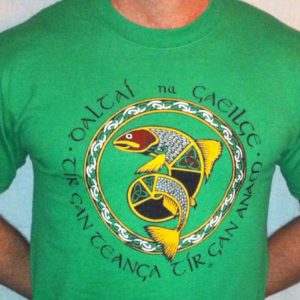Fáilte (Welcome) › Forums › General Discussion (Irish and English) › Aistriúchán ar “silverback gorillas”
- This topic has 8 replies, 1 voice, and was last updated 7 years, 3 months ago by
Héilics Órbhuí.
-
AuthorPosts
-
January 5, 2017 at 9:17 pm #36938
STLbhoy
ParticipantOne of the sponsors for my GAA club’s pub league wants to have a nickname in Irish on the back of their shirt, and they said they wanted the Irish for “Silverbacks” or “Silverback Gorillas”
I wasn’t sure if there’s a known word for this animal. I’m a novice myself but came up with “na Goraillí geal-liath” – but that’s a bit long.
Is there a good way to say Silverbacks as Gaeilge?
January 7, 2017 at 3:48 am #46046Héilics Órbhuí
Participanthttp://www.tearma.ie/Search.aspx?term=silverback&lang=3116649
‘goraille droimairgid’ dar leis an bhForas.
January 9, 2017 at 5:04 pm #46047STLbhoy
ParticipantGo raibh maith agat, I had seen that translation – would I need to do anything to the adjective to make it plural? Or would it just be “goraillí droimairgid”?
January 9, 2017 at 7:19 pm #46048Héilics Órbhuí
ParticipantPrecisely. You don’t need to do anything to it because it’s technically not an adjective, it is a genitive noun acting as an adjective, which as you probably know is fairly common in Irish.
January 9, 2017 at 8:13 pm #46049STLbhoy
ParticipantThank you – so if I wanted to shorten it to just “silverbacks”, would I then take the genitive plural of airgead? i.e. “Na droimairgead”?
January 9, 2017 at 8:41 pm #46050Héilics Órbhuí
ParticipantI personally wouldn’t attempt to shorten it in the same way you would in English. I doubt anyone would have a clue what you’re talking about.
Even if you wanted to, doing so is grammatically problematic. In some cases, you will have words that are both adjective and noun in Irish, i.e. Gormach / gormach, and in these cases it’s fairly easy to pluralize them as nouns, i.e. na gormaigh. But this isn’t really the case with genitive nouns acting as adjectives, at least not that I’ve ever seen. Fortunately, silverback just describes a male gorilla, so if you want to refer to them succinctly after having already introduced the concept, you could just say ‘na fireannaigh”.
Additionally, I don’t think this term is actually in use by anyone. Many of the words and terms Foras na Gaeilge comes up with for newer and scientific concepts are artificial in that they have never been used in the existing Irish corpus. I’d be surprised if there is actually a work of authentic Irish writing that includes silverback gorillas. So the issue there is twofold: 1. it’s relatively difficult to know what someone would actually call them in “real” Irish and 2. this ambiguity forces you to be fairly explicit so that “real” Irish speakers would even know what you’re referring to.
That’s my take on it anyways. For all I know I’m wrong. But if you do a Google search for “droimairgid” you will get essentially nothing aside from an older thread on the translation forum asking what you’re asking now, which isn’t a good sign. Irish is not known for its wealth of scientific literature, unfortunately. Even the Wikipedia article on “goraille” is about 2 sentences long.
January 9, 2017 at 9:14 pm #46051STLbhoy
ParticipantThanks for the insight – I’ll take it back to the sponsor and see what they think. Ultimately with this being an American hurling club none of them speak Irish to criticize anyway – just wanting to avoid embarrassment when we travel by putting cheap translations or bad grammar on the back of 30 shirts. Go raibh maith agat arís!
January 10, 2017 at 1:45 pm #46052Labhrás
ParticipantFor me, “goraille droimairgid” sounds wrong.
It means “backsilver g.”, not “silverback g.”.(droimairgid [del]is [/del] would be the genitive of a noun “droimairgead” which would mean “backsilver” and never “silverback”)
January 10, 2017 at 5:31 pm #46056Héilics Órbhuí
ParticipantThere are precedents for this order, however. Words like “foltfhionn” readily defy the logic you are using by combining the noun+adjective in the counter-intuitive word order.
-
AuthorPosts
- You must be logged in to reply to this topic.
